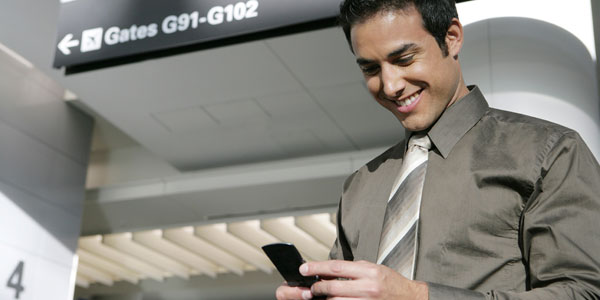
Mobile technologies will feature prominently at the upcoming Future Travel Experience Asia conference, taking place in Hong Kong, May 7-9. One company dedicated to its advancement is Exicon. Based in China and staffed by a multi-lingual, multinational team, it works to simplify the creation, deployment and management of mobile applications for some of the world’s biggest companies allowing them to accelerate their success in mobile.
According to flight information specialists FlightView, smartphones make up 82% of all personal entertainment devices taken by passengers on board flights. Meanwhile, SITA statistics show that 88% of airports plan on investing in mobile technologies by the end of 2015.
Ahead of a presentation from Exicon CEO Stefan Rust at FTE Asia 2013, FTE spoke to Exicon founder and Executive Vice President Cat Purvis about its work on improving the passenger experience and the future of mobile up in the air.

Freeing the familiar
“The fact that airports and airlines are still charging for wireless internet access is extraordinary,” explained Purvis. “They have the passengers captive! Why would they not work together, with as many partners as possible, to deliver the very best service possible? The two cannot work isolated from one another anymore, it simply does not work. For the next big advancement in mobile technologies, I just want access to what I can already freely access on the ground.”
Whilst Exicon may emphasise the importance of free WiFi, according to a survey conducted by inflight communications experts IMDC only 16% of the world’s global commercial fleet offered a WiFi service of any sort at the end of 2012.
“Airlines need to realise that the customer does not love them; the customer feels indifference towards them. It is not a love affair. They need to make the entire passenger experience as painless as possible for the traveller.”
“If we are to assume that free WiFi is an absolute must, communication is the very next key thing – the airline communicating with the passenger. From check-in, to baggage drop, to the flight, the experience needs to be as painless as possible. Automatic offering of upgrades, the saving of my preferences. Constant communication.”
Currently only 10% of airports provide wayfinding services to passengers, although that number is predicted to jump to 70% by 2015, an indication that airports are beginning to pick up on Purvis’ philosophy, if a bit slower than she would like.
“If I were in charge of an airline’s mobile development I would go absolutely hell for leather. I would really make them think about the passenger experience from end-to-end. I would open every avenue possible and work with every client possible – I want you to want to download my app. It does no good for an airline to simply follow the trend. In reality it will take a while to get there, and it will be a very brave company that goes for it.”
Less is more
When it comes to the passenger experience for airlines in Asia though, Purvis believes they are not all headed in the right direction: “Cathay Pacific is recognised as one of the best airlines in the world. They have done a beautiful suite of applications, but their functionality is fairly standard. They play on the beauty and the luxury department, and I don’t think this is the way forward. Most passengers are looking for functionality. They want a streamlined experience. Passengers hate to travel – if you could teleport me from one location to another, I would do that. I would not take a plane if I did not have to. Airlines must solve that number one pain for passengers – all the other bells and whistles are unimportant.”
“At Exicon we recently held a session with numerous GM’s from various airlines. We talked about all of the various little options, this, that and the other. At the end of the day I asked them, ‘Who cares first and foremost about getting the passenger from A to B?’ – every hand shot up. I said ‘Right, that is what we need to focus on’. I wouldn’t say it is a trend in Asia to focus on the frivolities, it just so happens that a number of luxury airlines are based within Asia.”
At the crux of the airline mobile conundrum lies a fundamental misinterpretation of its role: “If you look at businesses in other sectors that have successfully used mobile, it is an extension of their brand. It is a channel that connects customers when they want to a brand that they know. It needs to bring core functionality to the device you choose to use. If the customer has downloaded the airline’s app then they are already loyal – they have already welcomed the company onto their device. Why should they then not be offered what they want? In the pre-mobile era, airlines would never set up a physical check-in office without a clear idea of its role and what it would do. It should be the same with apps.”
Mobile technologies are high on the agenda at FTE Asia 2013. The Fifth Working Session, lead by Stefan Rust, CEO, Exicon, explores the future opportunities in mobile technology for the benefit of the passenger, while Tarik Kiki, Ground Product Manager, Jetstar, will identify the role of mobility in Jetstar’s self-service solution. 9:30 – 10.30, Thursday 9 May.





